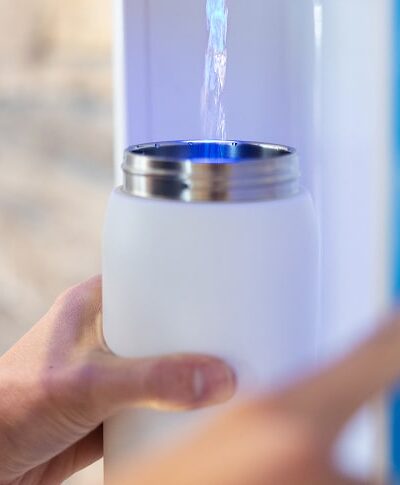If you’ve got a busy schedule packed full of important meetings and must-meet deadlines, coming down sick can throw a wrench in your plans.
Did you know there are some basic precautions you can take to ward off illness?
Though health and wellness are always important, they’ve never been as essential or topical as they are now. As many companies return to the office, it’s important to know how to stay healthy in the workplace.
Whether you’re an employee who wants to take smart, reasonable precautions or an employer who has the goal of keeping employees healthy by adhering to laws such as the OSHA drinking water requirements, our complete guide on workplace wellness has got you covered. Read on for our top seven tips to keep you feeling your best.
#1 Keep Your Stress Down
One vital way to stay healthy in the workplace is to lower your stress levels. Though the workplace is full of potential stressors, from deadlines to paperwork to your coworker who is always five minutes late, it’s important to develop strategies that preserve your calm (and with it, your health).
Chronically stressed people tend to experience:
- Anxiety
- Hypertension (aka high blood pressure)
- Sleeplessness
- Heart disease
- Stomach issues
Managing your stress levels is not only key to maintaining your physical health. It’s also essential for strengthening your mental wellbeing. So, how can you tackle stress? The best strategy for swatting back anxious thoughts is unique to each person. Pre-work meditation sessions, lunchtime walks, and afternoon yoga are all potential methods for tackling nerves.
Likewise, many of the other tips in this guide can do double duty helping preserve your health while simultaneously reducing your stress.
#2 Stay Hydrated
An easy way to keep your stress down is to make sure you’re consuming enough water. Since dehydration makes stress worse, drinking water will help alleviate office tension and improve your health. In fact, some of the major benefits of drinking water at work include better focus, improved energy levels, and a more responsive metabolism.
Staying hydrated is also an easy and effective way to stay healthy year-round. There’s never a bad time to drink water: it’s crucial for your physical wellbeing, and becoming dehydrated is easier than you think. If you don’t drink enough water, you could suffer from:
- Migraines
- Constipation
- A loss of focus
- Restless sleep
- Excessive tiredness
- Mood issues
Your brain is especially sensitive to dehydration, which means it’s critical to make sure you’re drinking enough throughout the day. But if you’re someone who finds that repeated trips to the water cooler interrupts your workflow, you might find it difficult to drink your recommended eight glasses of water.
In that case, you could try bringing bottled water to the office and keeping it at your desk with you. FloWater offers an ‘On the Go’ 9 Pack of our crisp tasting water—the perfect solution for your hydration needs. One bottle is sixteen ounces—about two cups of water. And our bottles are made out of recyclable aluminum, letting you help eliminate plastic waste while you hydrate.
#3 Don’t Drink Too Much Caffeine
Most people reach for coffee, tea, or another caffeinated beverage as a pick-me-up when office life becomes hectic. But as much as you might love the morning coffee you buy from your local cafe, it can become a problem when one cup turns into three.
Excess caffeine can have a whole host of negative effects on your health. If you’re someone who regularly overindulges in caffeinated drinks, you could experience problems such as:
- Jitters or shakes
- A rapid heartbeat
- Anxiety
- Elevated blood pressure
To avoid these side effects and conditions, try replacing all cups of coffee after your first one with water. This will keep you alert and focused without making you jittery or prone to crashes. And drinking water instead of your regular caffeinated beverage has the bonus effect of also eliminating any sugar you might have consumed in that drink, helping keep your heart health on track as well.
#4 Stay Masked
Though you probably hear this one a lot in this day and age, staying masked is one of the easiest and most effective actions you can take to avoid being infected with or transmitting COVID-19 and other airborne illnesses.
But wearing an effective mask requires a little more than picking the first cute one you see. When choosing a mask to wear to the office, look for one that:
- Doesn’t gap along the edges of your face when you put it on
- Fits securely with a nose wire on the top
- Has at least two layers
- Has no valve on the side which would let particles out
- Ensures your mouth and nose are both fully covered
Putting on a mask when you head back to the office is one of our critical health and wellness tips for employees. Not only will you be helping to stem the spread of COVID, but you’ll also be less likely to come down with general colds and flus that can sap your energy and put you behind on your to-do list.
#5 Take Screen Breaks
Even though your computer is probably a vital part of your job, it can be essential to take breaks from it. Powering through too many unanswered emails in one sitting or going to several online meetings back-to-back can lead to a couple of conditions that are harmful to your body and your wellbeing, such as:
- Eye strain – Looking at your computer for too long is hard on your eyes and can make it harder to focus on your work. Fortunately, you can combat eye strain by ensuring you don’t sit too close to the computer. To do so, keep an arm’s length of distance between you and your computer screen, even if that means increasing the font size.
- Headaches – These can come from eye strain or increased light sensitivity caused by too much time in front of a screen. A headache can put you in an unpleasant mood and even derail your whole workday flow.
While many people find it prudent to keep Advil or another anti-inflammatory handy, taking a break can cut a headache off before it begins.
If you’re in a situation where you’ve got a lot on your plate and you don’t have the time for a screen break, you can drink water to mitigate some of the effects of too much screen time. Water helps reduce or prevent headaches, meaning that making a few trips to your office water cooler during jam-packed days can help reduce any unpleasant screen-time effects you might experience.
#6 Sleep Well at Night
Getting quality sleep is another healthy habit that shouldn’t be underestimated. Another one of our best health tips at work is to make sure you’re getting restful sleep. While you might want to stay up late and binge your new favorite Netflix show, doing that too many nights in a row will lead to trouble—and not just because you’ll be too tired to focus on work.
The average adult needs to have between 7-9 hours of sleep a night. Long term deviation from that amount of sleep can lead to:
- Decreased focus
- Increased stress
- Diabetes
- A higher chance of developing heart disease
- An increased risk of obesity
No matter how hooked you are on your new show, it’s a smart idea to turn off the TV past a certain hour and get some shut-eye. Your body will thank you for the much-needed rest.
#7 Bring Nutritious, Home Cooked Meals
Healthy eating is a must for everyone, not just professionals. Yet, no list of health and wellness tips for employees is complete without a nod to a healthy diet. While it might be tempting to run to McDonald’s for lunch, snack periodically on the cookies your coworker keeps on his desk, or even skip lunch entirely and power through all the work on your plate, missing meals isn’t beneficial for your overall wellness. Investing in healthy meals not only boosts energy but also boosts productivity.
If you have bad eating habits, you might find yourself suffering from some of the following problems:
- Low blood sugar – If you’re not eating enough because you regularly skip lunch in favor of work, you might have this issue. Low blood sugar occurs when you wait too long between meals or snacks. It can make you feel hungry, irritable, and dizzy at the extreme end of the spectrum.
- Weight gain – If you’re constantly hitting the vending machine or grabbing snacks from the office candy bowl, you may eventually start to gain some weight. To prevent this outcome, limit snacking.
While a healthy diet is vital to your general wellbeing, drinking water is an underrated element of that. You can’t have a truly healthy diet if it doesn’t include your daily recommended water intake.
Despite having a busy schedule, making sure that you are drinking enough water and opting in for healthy food options is a must for maintaining your health year round. A healthy lifestyle not only improves your physical health but also your mental health. And by pivoting your daily habits, you might just achieve that work life balance that most people could only dream of.
Make FloWater Part of Your Wellness Routine
Staying healthy in the workplace doesn’t require a desk treadmill, a new diet, or an expensive fitness watch. In fact, simple steps like drinking water, whether it be from a water dispenser or reusable water bottle, can help improve your year-round health.
Flowater’s Touchless Water Dispenser puts you in control of the water you’re drinking. There are no unpleasant surprises—only our clean, delicious water. But exactly how clean is it? FloWater removes up to 99.9% of things you don’t want to drink, such as microplastics, viruses, and other impurities.
All of our bottled water is alkalized and remineralized. It also comes in eco-friendly aluminum bottles that make drinking it a guilt-free experience.
Try FloWater today and see the difference we can make in your wellness routine.
Sources:
CDC. Your Guide to Masks. https://www.cdc.gov/coronavirus/2019-ncov/prevent-getting-sick/about-face-coverings.html
WebMD. 10 Tips to Improve Your Health at Work. https://www.webmd.com/women/features/10-tips-to-improve-your-health-at-work
CNN Health. Benefits of water: Are you getting enough fluids to stay healthy? https://www.cnn.com/2017/09/27/health/benefits-of-water-and-fluids/index.html
Time. Here’s How Much Experts Think You Should Sleep Every Night. https://time.com/3691992/sleep-hours-recommendations/





